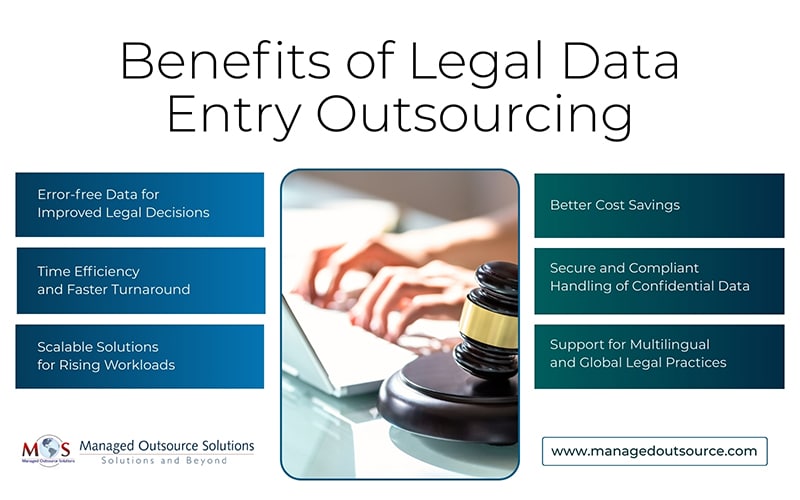“Poor data quality costs organizations a staggering $12.9 million in lost revenue, annually.” —Gartner
Considering this fact, legal firms handle vast amounts of information every day with each byte of data having a high stake in legal proceedings. A single data entry mistake can possibly jeopardize the entire case and eventually cost the firm millions in penalties and lost clients.
With law firms now increasingly digitizing their records and embracing state-of-the-art cloud-based workflows; the accuracy, security, and integrity of legal data have never been more critical, or more vulnerable.
Regardless of whether you’re a small law office or an established legal enterprise, the sheer volume of contracts, litigation documents, court filings, and client records can quickly become overwhelming. That’s where professional legal data entry services take the limelight—not just as a mere support tool, but as a strategic necessity for legal document management.
Legal Data Management – The Present Scenario
Traditionally, legal data entry was a time-consuming, manual process prone to error. A single comma, spelling mistake or an incorrect date could lead to misinterpretations or even malpractice litigation, leading to severe legal penalties. Beyond that, non-compliance with data privacy laws like GDPR and CCPA can bring heavy fines and reputational damage.
With digital transformation now sweeping through, law firms are now left dealing with an exponential, consistent stream of data from multiple sources viz, emails, scanned documents, audio transcripts, case files, billing records, and court systems. Ensuring all of this is accurately captured, categorized, and securely stored is a monumental task—a key driver for utilizing data entry services for law firms.
The Modern Role of Data Entry in Legal Landscape
Unlike traditional data entry that involves typing information into spreadsheets or case management systems, modern outsourced legal data processing comes with a plethora of features:
- Document digitization and indexing
- Optical character recognition (OCR) for scanned files
- Data validation and cross-verification
- Tagging and classification of case materials
- Metadata creation for faster searchability
- Integration with legal tech platforms and CRM systems
Outsourcing these tasks to a reliable provider offers law firms a way to maintain accuracy while reducing costs and freeing up internal resources for client-facing and strategic work.
What Are the Benefits of Legal Data Entry Outsourcing?
- Error-free Data for Improved Legal Decisions
Accuracy is paramount for every legal action. Professional data entry services utilize multi-tiered quality control processes, including double data entry and real-time validation checks, to assure precision. This in turn contributes to fewer errors/reworks, and more time to focus on strategy and advocacy.
- Time Efficiency and Faster Turnaround
Legal teams are often stretched thin. Outsourcing time-consuming data tasks accelerates document processing and ensures critical information is available when needed, whether for court submissions, contract reviews, or client reporting.
- Scalable Solutions for Rising Workloads
Legal practices often face workload spikes, especially during litigation surges, M&A activity, or audits. Outsourcing allows your firm to scale data entry support up or down as needed without the burden of hiring or training new staff.
- Better Cost Savings
Hiring and training in-house data teams is expensive and time-consuming. Outsourcing offers access to trained experts and legal technology at a fraction of the cost; without sacrificing precision or compliance.
- Secure and Compliant Handling of Confidential Data
With cyber threats and regulatory scrutiny at an all-time high, data security is non-negotiable. Leading outsourcing providers adhere to stringent security protocols, including encryption, access control, and regular audits to ensure confidentiality and regulatory compliance.
- Support for Multilingual and Global Legal Practices
With international clients and cross-border transactions on the rise, legal firms often manage documents in multiple languages. A competent outsourcing partner can support multilingual data entry and localization, ensuring legal data accuracy across jurisdictions.
What Legal Data Entry Services Typically Handle
Modern legal data entry services cater to a wide range of requirements, including:
- Case File Summarization
- Relevant Data Extraction
- Deposition and Trial Transcripts
- Client Intake Forms
- Billing Records and Timesheets
- Legal Research Data Entry
- Real Estate and Property Documents
- Intellectual Property Filings
- Litigation Document Management
Emerging Tech in Legal Data Entry Industry
In order to stay competitive, modern data entry services utilize cutting-edge technologies to improve accuracy and efficiency.
- Artificial Intelligence (AI): AI has been a revolution. In data entry, it can automate routine tasks, identify patterns and flag inconsistencies, reducing the likelihood of errors.
- Optical Character Recognition (OCR): OCR enables conversion of different types of documents—scanned paper documents or PDFs, into editable and searchable data.
- Cloud-based Solutions: They foster real-time collaboration, data storage, and access from multiple locations, ensuring that legal teams can work seamlessly from anywhere.
Even though automation is powerful, it still needs the oversight of skilled professionals to ensure context and legal nuance aren’t lost. Therefore, by integrating these technologies under expert supervision, outsourced data entry services provide law firms with reliable, efficient, and secure data management solutions.
How to Choose the Right Legal Data Entry Partner
Kindly take note that all outsourcing services are NOT created equal. When opting for a legal data entry provider, keep the following in mind:
- Experience in handling legal data and documents
- Knowledge of legal terminologies and formatting standards
- Robust data security measures and compliance certifications
- Availability of skilled professionals with legal backgrounds
- Customizable workflows to match your firm’s systems
- Scalability and turnaround time guarantees
Partnering with an experienced provider like Managed Outsource Solutions ensures your legal data is in safe hands; entered with precision, stored securely, and ready for use when and where you need it.
Final Thoughts
The cost of legal data errors isn’t just financial—it has to do with your reputation. In a world where clients expect speed, accuracy, and transparency, outdated data processes are no longer an option.
Outsourcing legal data entry is no longer a matter of convenience or saving a few bucks, it’s a strategic move that ensures your law firm remains agile, compliant, and client-focused. By collaborating with the right outsourcing partner, your legal team can shift their focus from data wrangling to what they do best: winning cases and delivering exceptional service.





